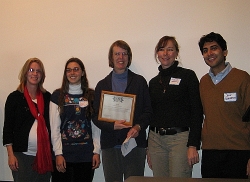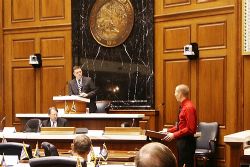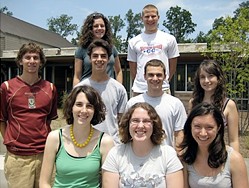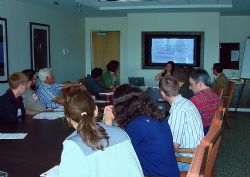DePauw Environmental Group Captures Indiana's Attention
December 8, 2008
 On a snowy weekend in Indianapolis, more than a hundred people from across Indiana gathered in a small room at the Holliday Nature Park Center. Members and friends of the Hoosier Environmental Council (HEC) had come together for the organization's annual meeting and celebration of its 2008 award recipients. Executive Director Jesse Kharbanda's final award was saved for their “Environmental Organization of the Year,” presented to a group he said “confounded the expectation of what can be accomplished on a college campus,” the DePauw Environmental Policy Project (DEPP).
On a snowy weekend in Indianapolis, more than a hundred people from across Indiana gathered in a small room at the Holliday Nature Park Center. Members and friends of the Hoosier Environmental Council (HEC) had come together for the organization's annual meeting and celebration of its 2008 award recipients. Executive Director Jesse Kharbanda's final award was saved for their “Environmental Organization of the Year,” presented to a group he said “confounded the expectation of what can be accomplished on a college campus,” the DePauw Environmental Policy Project (DEPP).
The DEPP program is a collaborative effort between students and faculty members interested in affecting Indiana's environmental policies. Its student members have testified before the State Legislature on multiple occasions, earning the group the respect of legislators and environmental organizations in the program's first year.
The New Face of Lobbying
In the middle of September, Michael Lutz '09 stood before a tired committee in the legislature. Two of its members had just exchanged words that might have created more tension if the other Committee members weren't so seemingly familiar with their exchanges. For any citizen testifying for the first time, the atmosphere in the chamber would have been discouraging, to say the least.
 Lutz, who has a background in debate, knew that his topic's relative obscurity—geothermal energy systems—was an advantage. It wasn't likely that the Indiana State House committee (or its two sparring members) had debated geothermal, at least not recently. The technology has been around for nearly a century, but has been absent from discussions about whether or not to create incentives for adopters of environmentally-friendly energy alternatives.
Lutz, who has a background in debate, knew that his topic's relative obscurity—geothermal energy systems—was an advantage. It wasn't likely that the Indiana State House committee (or its two sparring members) had debated geothermal, at least not recently. The technology has been around for nearly a century, but has been absent from discussions about whether or not to create incentives for adopters of environmentally-friendly energy alternatives.
After Lutz (pictured right) had spoken, two Indiana geothermal business representatives, an engineer and an architect, followed. He had contacted them during the course of his research and had gone back to them after his testimony date was set. By the time all three were finished, the once-oppressive atmosphere had been noticeably lightened. At some point, whatever tension was in the room had taken a back seat to just how interesting, and how sensible geothermal energy seemed.
The testimony was the result of months of preparation. During the summer, he and other DEPP members studied environmental topics of their choice with the goal of affecting state policy during the upcoming legislative session in January. Off-session testimonies like his are important to the process, as committee members are key players in what legislation is later passed. Lutz's goal was to plant a seed: that geothermal belongs in the same discussion as solar, wind power, and even traditional energy.
DEPP’s Origin
DEPP’s origin varies depending on who you ask, but one thing is certain: DEPP was not started in a meeting room. Almost by necessity, the program's beginnings followed the same bottom-up blueprint as any other grassroots organization.
Following a 2007 Forbes article ranking Indiana as the nation's 49th “greenest” state, Kelsey Kauffman, a part-time assistant professor of university studies, began to think about a Winter Term class during which her students had testified before state legislators. A bill had been proposed that would increase the size of drug-free zones in the state. At face value, the increase made sense, but Kauffman's students presented testimony and maps showing the proposal’s unintended consequences; in the days following their presentation, the proposed expansion was defeated.
Keelin Kelly '10 was part of Kauffman's group at the time. Now a member of DEPP, Kelly remembers her first trip to the legislature and the impact it had.
 “I hadn't expected the legislators to take us so seriously. The experience really proved that thorough research can make a big difference. I was excited when DEPP was proposed because I knew it would afford me a similar opportunity to be involved in the policy making process.”
“I hadn't expected the legislators to take us so seriously. The experience really proved that thorough research can make a big difference. I was excited when DEPP was proposed because I knew it would afford me a similar opportunity to be involved in the policy making process.”
Hoping to duplicate her students' success in response to the Forbes report, Kauffman, who had no background in environmental policy, contacted Jen Everett, an assistant professor of philosophy and coordinator for the DePauw’s branch of Focus the Nation, a climate and energy forum organized on college campuses.
Kauffman approached Everett and asked, “The sustainability work you're doing on campus is great, but shouldn't we be doing this at the state level?”
When the idea reached Anthony Baratta '11, a member of Everett's Focus the Nation group, an important loop between faculty members and students was closed.
“I e-mailed Kelsey Kauffman to get more information, and she told me about her idea,” says Baratta. “The program would be a full-time summer internship, a fall course, and a Winter Term. Before Christmas break [in 2007], we organized a meeting of people who would possibly be interested in participating. About 14 people attended, but we had no idea how to get funding for the project.”
The funding question was resolved the following February during a meeting between Everett, Kauffman, and former DePauw President Robert Bottoms. All three proposed components of the project—internship, course and 2008 Winter Term—were approved.
The DEPP Model
During a fall meeting on the grass in front of DePauw’s East College, Kauffman and Everett were mostly silent as the group conducted a mock testimony on the topic of CAFOs, or concentrated animal feeding operations. As the discussion progressed, it was clear that there were experts on the subject within the group. Other class members, focused in different areas of sustainability, became legislators, business people, and other key pieces of a legislative process that isn't always friendly to advocates of change. Throughout the process, Kauffman and Everett interjected only to remind students of procedure or to ask a question. Their role as facilitators limited their control by design, but their input was also limited by the fact that each student had become a true expert in his or her focus.
The HEC award seems to validate DEPPs quasi-egalitarian structure. It's a structure that relies on tremendous effort on behalf of its members, but has provided them with a true experiential learning experience, and the state of Indiana with capable voices in environmental policy.
 “It has been empowering in the truest sense of the word,” says DEPP member Andrew Maddocks '11. “We became collaborative equals with our professors, and learned through our own exploration rather than their dictation. It has been difficult at times. Creating your own assignments requires discipline and initiative to a different degree than a traditional class. This is something I've really valued and will remember for a long time.”
“It has been empowering in the truest sense of the word,” says DEPP member Andrew Maddocks '11. “We became collaborative equals with our professors, and learned through our own exploration rather than their dictation. It has been difficult at times. Creating your own assignments requires discipline and initiative to a different degree than a traditional class. This is something I've really valued and will remember for a long time.”
The program's future is uncertain at this point, but recent events may point to expansion of the DEPP model. In early October, DEPP hosted “IN-ergize 2009,” a conference on sustainability that brought students, professionals and legislators from across the state to the Janet Prindle Institute for Ethics. It's possible that the sharing of ideas at that conference may lead to a larger, state-wide student organization. But for now, members of DEPP are focused on the upcoming legislative session that will occupy their Winter Term.
“I think the experience of this program in learning about the political system in Indiana has been invaluable in itself,” says Baratta, “let alone the information we've learned about specific energy and environmental issues.”
Adds Lutz, "This is service learning that is really the best of service and the best of learning."
DEPP will be publishing a bi-weekly online newsletter. Its first edition can be read here.
